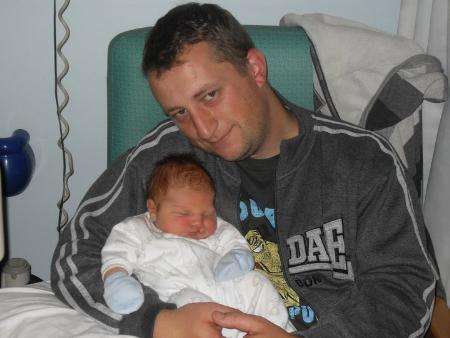Study calls for better support for fathers of children with cleft lip or palate

Research psychologist Nicola Stock says fathers need better support to enable them to deal with the challenges of having a child born with a cleft lip or palate. Her research shows that appropriate support is not yet available to fathers even though they play a key role in their child's development and family well-being.
Nicola, whose paper on the experiences of fathers of children with cleft has just been published in the Cleft Palate-Craniofacial Journal, is from UWE Bristol's Centre for Appearance Research.
She conducted in-depth interviews with fathers from across the UK about their experiences of having a child born with the condition.
She said, "Cleft lip/palate is the most common congenital craniofacial condition, affecting one in every 700 babies born per year in the UK.
"Following a diagnosis of cleft in their child, parents are likely to feel shocked and daunted by the potential challenges that lie ahead. Being able to access the appropriate support when it is needed is vital to the psychological adjustment of families affected by cleft.
"Fathers play a key role in their child's development and have a strong influence over the wellbeing of the family unit as a whole.
"Following a diagnosis of cleft lip/palate in their child, fathers typically adopted an information-seeking and support-giving role. They believed they had to remain proactive, strong and positive in order to support their wife and new-born effectively, but in doing so felt there was no outlet for their own thoughts and emotions.
"This study demonstrates that some fathers feel there is little or no support network available to expectant fathers in general, and that having a baby with a health condition made this even more evident."
She recommends that fathers would be better supported throughout their child's diagnosis and treatment by:
- training and resources for non-specialists such as sonographers, midwives and general practitioners
- access to genetic counselling and making the causes of cleft a focus for future research
- realistic information regarding outcomes of surgery and treatment, coping with other people's reactions to the cleft, concerns around teasing and bullying and how to discuss the cleft with their child
- support on an individual basis, including the opportunity to speak with other parents affected by the condition
- fostering families' strengths and accentuating the positives, rather than focusing solely on difficulties and deficits
- ensuring that ongoing support is available for this life-long condition
The Cleft Lip and Palate Association (CLAPA) has supported Nicola to promote the study. Chief Executive Officer Rosanna Preston said, "CLAPA is a membership association supporting people affected by cleft lip and/or palate. Our activities are directly influenced by our members and it's important that we support all people affected by cleft.
"This research has given us valuable information about how we can best support fathers throughout the process of diagnosis and treatment for their child."
One of the fathers who took part in this study said, "This is a fascinating and insightful study which is relevant not only to my experiences but to many fathers affected by cleft. I am really pleased to have been able to help with this."
Another father commented, "I'm sure this study will be of a massive benefit to the cleft community and will hopefully provide health professionals with the praise they deserve, and some clear guidance as to where they can improve."
More information: A summary of the research findings is now available online via www.bristol.ac.uk/cleft-collective













